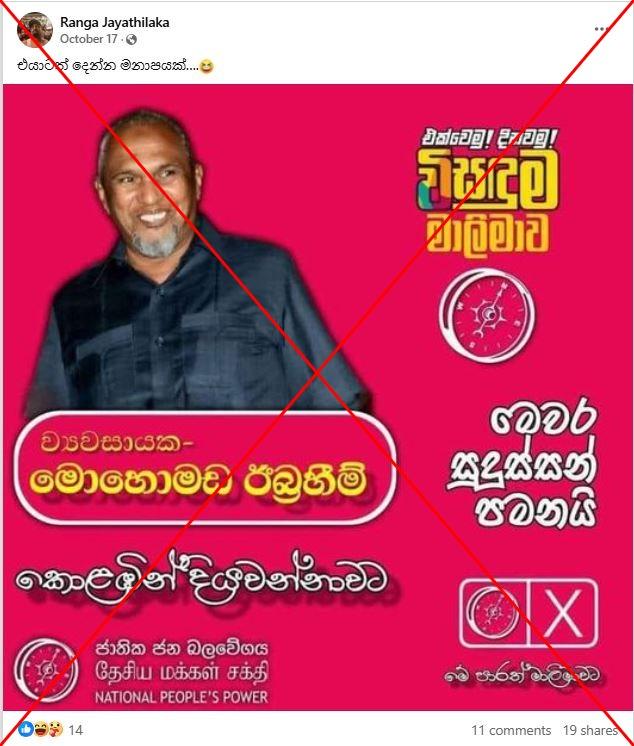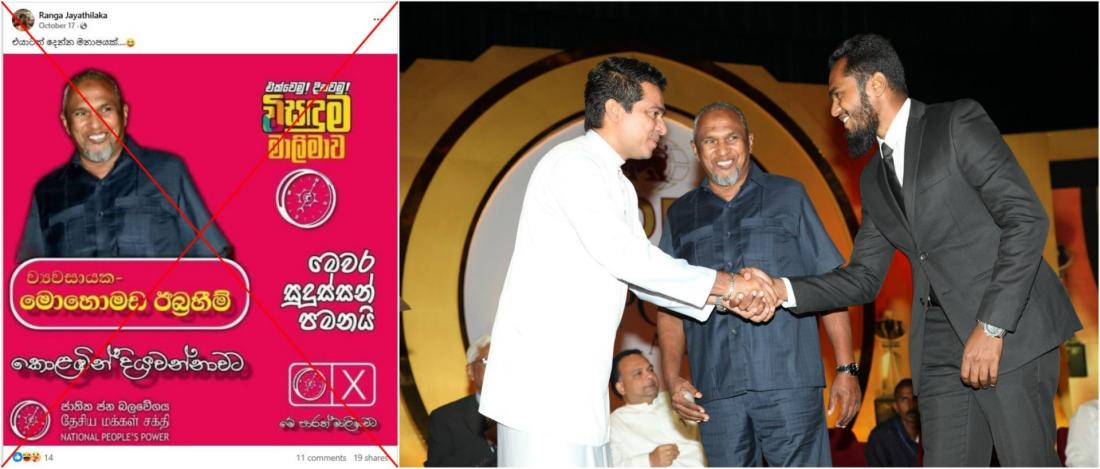
Father of Sri Lanka Easter bombers did not run for parliament in 2024: govt documents
- This article is more than one year old.
- Published on November 25, 2024 at 06:13
- 2 min read
- By Harshana SILVA, AFP Sri Lanka
"Give him a vote," read a Sinhala-language Facebook post shared on October 17, 2024.
It included an image appearing to show a campaign poster for wealthy spice trader Mohamed Ibrahim, the father of two suicide bombers in the 2019 Easter attacks considered the worst-ever against civilians in the island nation (archived link).
Police at the time arrested Ibrahim as they launched an investigation into the horrific bombings that killed 279 people. He was granted bail in 2022, according to local newspaper The Morning (archived link).
The image in the posts bore the logo of the country's ruling National People's Power (NPP) coalition -- led by President Dissanayake and mainly composed of his JVP party.
Part of the image's text overlay claimed Ibrahim was seeking a seat in parliament for the capital Colombo.

Similar posts were also shared here, here and here.
They circulated after Dissanayake -- who was swept to power in September on a promise to combat graft and recover stolen assets in the bankrupt island nation still reeling from a financial crisis that imposed widespread hardships -- dissolved parliament and scheduled an early election for November 14 (archived link).
His decision to immediately call polls nearly 10 months ahead of schedule and secure parliamentary backing for his agenda was vindicated, with the NPP coalition taking 159 seats in the 225-member assembly (archived link).
The claim that Ibrahim was among the candidates for Dissanayake's party, however, is false.
Snap elections
AFP reviewed the official list of candidates released by Sri Lanka's election commission on October 11 ahead of the snap elections and found no mention of Ibrahim (archived link).
His name also does not appear in the commission's list of election winners or in NPP's list of nominees for parliament (archived links here and here).
Upul Ranjan, a spokesperson for both the JVP party and the NPP coalition, also refuted the posts circulating online.
"His name was added to the national list of JVP in 2015, since he was supportive of the party. But after Easter Sunday attacks we don't have any connection or affiliation with him," Ranjan told AFP on October 29.
A reverse image search found Ibrahim's image in the false posts was a cropped version of a photo posted on the official Facebook page of former state minister for international trade Sujeewa Senasinghe on August 9, 2016 (archived link).
Below is a screenshot comparison of the image in the false posts (left) and Ibrahim in the picture from 2016 (right):

Dissanayake's government announced a new probe into the Easter bombings on October 8, saying previous investigations had failed to identify other culprits responsible for the country's worst-ever attack against civilians (archived link).
In the aftermath, officials blamed a local jihadist group for the suicide bombings on three churches and three hotels, but a top Sri Lankan intelligence official was also accused of orchestrating the attack.
Copyright © AFP 2017-2026. Any commercial use of this content requires a subscription. Click here to find out more.
Is there content that you would like AFP to fact-check? Get in touch.
Contact us
